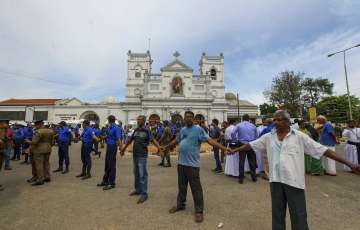The near-simultaneous blasts targeting three churches and as many luxury hotels in Sri Lanka on Easter Sunday may have an "adverse impact" on the upcoming summer holiday season in the country, a well-known tourist destination, tour operators and hoteliers said.
A string of near simultaneous blasts struck three churches and luxury hotels frequented by foreigners in Sri Lanka on Easter Sunday, killing more than 160 people and injuring over 450 others, shattering a decade of peace in the country after the end of the brutal civil war with the LTTE.
India is the largest source market for Sri Lanka, which received 2.3 million tourists from around the world in 2018.
Around 450,000 Indian tourists visited Sri Lanka last year and the island nation was expecting the total Indian tourist arrivals to cross one million mark in 2019.
The explosions at the start of the travel season is likely to impact the annual tourist footfalls. The tourism authorities said they were worried that the attacks will affect the industry in the coming months.
Tourism revenues in Sri Lanka increased to USD 362.7 million in November from USD 284 million in October 2018, according to a media report.
"There will be a downward trend, Tourism will get affected. There may be fund outflows," Prime Minister Ranil Wickremesinghe said.
Sri Lanka Association of Inbound Tour Operators (SLAITO) President Harith Perera said it was the first time that hotels have been directly attacked, asserting that it was unprecedented and had not happened even during the 30-year-old brutal conflict.
He said the attacks were likely to have an "adverse impact" on the summer holiday season that is coming up, the Sunday Times reported.
The three five-star hotels targeted in the blasts were the Shangri-La, the Cinnamon Grand and the Kingsbury.
Asked whether security has been beefed up at the other city hotels, Perera said the authorities were "still waking up from what has happened."
"This will create a lot of instability and send the wrong message," he said.
Hoteliers Association President Sanath Ukwatte said the attacks seemed to indicate that it was targeted at the Easter celebrations and Easter Mass.
"None of us are sure of what is happening," Ukwatte said.
He said all hotels have taken necessary precautions following the attacks.
No group has claimed responsibility for Sunday's attacks.
President Maithripala Sirisena has appealed for calm following the attacks.
"I have been shocked by this totally unexpected incidents. The security forces haven been asked to take all action necessary," Sirisena said.
Prime Minister Wickremesinghe termed the blasts as "cowardly attacks" and said his government was working to "contain the situation."
Sri Lanka's tourism industry faced a difficult time until a decade back due to the civil war with the LTTE which claimed at least 100,000 lives. However, in the recent years the island nation has emerged as a top tourism destination in Asia.
The island nation has developed the Ramayana circuit to woo Indian tourists by identifying several places connected with the ancient Indian epic.
Latest World News
